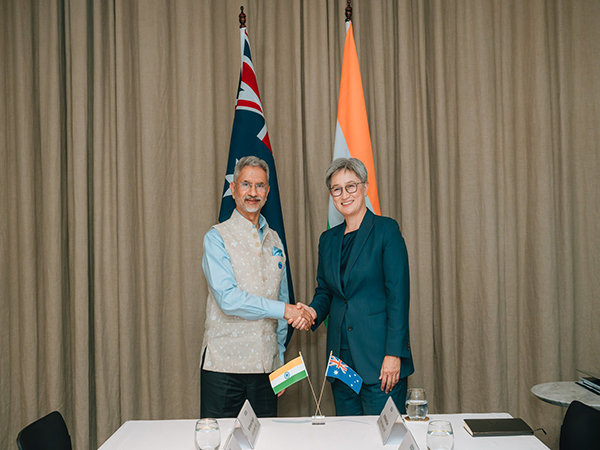
New Delhi: The recent Houthi rebel attacks in the Red Sea have raised concerns about stability and sustainability in the Indian Ocean region. At a conference in Perth, Australia, representatives from various countries emphasised the importance of maintaining peace and responsible development in the region.
The annual Indian Ocean Conference, organised by India's Ministry of External Affairs and the India Foundation, serves as a useful platform for regional dialogue. This year's edition, marking its seventh year, convened in Perth, Australia, on February 9th and 10th. Australia's Department of Foreign Affairs and Trade, and Singapore's S Rajaratnam School of International Studies, and the Perth-U.S. Asia Centre are also partnering in this effort.
"Towards a Stable and Sustainable Indian Ocean" was the theme for this edition, attracting ministerial delegations from over 22 countries and high-level officials from an additional 16 countries and six multilateral organisations. Beyond government representatives, the conference was attended by over 400 participants from diverse backgrounds, including business leaders, policy experts, academics, professionals, and media personnel from roughly 40 countries.
This gathering promises a vibrant exchange of ideas for shaping a brighter future for the Indian Ocean region. India highlighted the diverse challenges, ranging from armed conflicts and piracy to disregard for international law and threats to freedom of navigation. The Houthi attacks on shipping traffic and China's actions, which many consider violations of international norms, were specifically mentioned.
India also addressed the broader issue of economic concentration, suggesting that relying on a single source for production carries significant risks. He emphasised the need for diversification and increased regional cooperation to ensure a strong and stable Indian Ocean.
The Indian Ocean region faces intricate challenges which require multi-layered solutions. Existing mechanisms like IORA, IOC, and the Colombo Security Conclave, each working at their own pace, provide a foundation. Newer initiatives like IPOI and IPIEF address broader Indo-Pacific concerns. As members of multiple groups, India called upon other Indian Ocean countries to address challenges across various levels, simultaneously working on both the broader Indo-Pacific canvas and smaller sub-regional ones, recognising their reinforcing nature.
India's outlook has been proactive, engaging in 36 plurilateral groups since 2014, many relevant to the Indian Ocean's future. Land-based connectivity projects like the IMEC Corridor and Trilateral Highway can complement maritime flows.
Within IORA, India focuses on strengthening capacities, contributing to the Special Fund, and restructuring the Chair of Indian Ocean Studies. As the upcoming Chair (2025-27), India’s objective is to maximize IORA's potential.
The Indo-Pacific Oceans Initiative (IPOI), proposed by India, promotes cooperation in managing, conserving, and securing the maritime domain. Partner contributions from Australia, the UK, France, Indonesia, Singapore, Germany, US, and Japan have brought projects to life. IPOI aims to launch new initiatives and increase synergy with IORA.
BIMSTEC, a Bay of Bengal forum, also aligns with India's "Neighbourhood First" policy and "Act East" outlook. As the lead country for its Security pillar, India hosts the BIMSTEC Centre for Weather and Climate and facilitates cooperation in various areas. Infusing more resources can enhance its role.
The Quad's growing influence addresses diverse domains like maritime security, disaster management, and connectivity. Initiatives like the Indo-Pacific Economic Framework and Partnership for Maritime Domain Awareness stem from its discussions. While supporting the existing regional architecture, the Quad fosters global good, benefiting members and the wider region.
India's relations with the Pacific Islands have seen steady growth, with ambitious goals set at the May 2023 Port Moresby Summit. Projects like hospitals, research centres, and SME development initiatives reflect India's commitment to the Global South.
Incidentally, the 6th Indian Ocean Conference (IOC 2023), which was hosted jointly by India and Bangladesh in the latter’s capital Dhaka, saw participation from over 300 individuals from 40+ countries. India's External Affairs Minister, Dr S. Jaishankar in his keynote address declared the "Indo-Pacific region a reality" and a sign of globalisation surpassing the "1945 framework."
He commended Bangladesh's commitment to international law and its contributions to development. Recognising the distinct issues faced by Indian Ocean nations due to their history and geopolitical situation, he emphasized the need for a focused approach to their challenges. He further highlighted the importance of post-colonial connectivity and efficient links with ASEAN.
At the recently concluded seventh Indian Ocean Conference at Perth, Australia, the latter’s Foreign Minister appeared to echo some of India’s major concerns. Senator Penny Wong, expressed concerns about the region's future. She highlighted two key challenges. Wong expressed concerns about China's rapid military build-up and lack of transparency, which could increase tensions and uncertainty. She emphasised the need for transparency and reassurance in the Indian Ocean, a crucial trade route carrying a third of global bulk cargo and two-thirds of oil shipments. Disruptions due to piracy, disputes, or climate change could have severe global consequences.
While acknowledging these challenges, Wong announced new initiatives, such as a virtual hub for marine ecology research with India, to strengthen collaboration and address shared concerns in the Indian Ocean region.
In the backdrop of Houthi attacks and China's assertiveness, the seventh Indian Ocean Conference in Perth convened representatives from 22 countries, emphasising stability. India, a proactive participant, advocated for diversified approaches, highlighting challenges from armed conflicts to economic concentration. Initiatives like IPOI garnered global support, and existing mechanisms were reinforced.
Senator Penny Wong echoed concerns on military actions and climate threats. The bilateral meeting between Indian and Australian ministers showcased a commitment to strategic partnerships. As the conference concluded, the collective resolve for a stable and sustainable Indian Ocean emerged as a beacon, uniting nations to address challenges and foster enduring peace and prosperity.